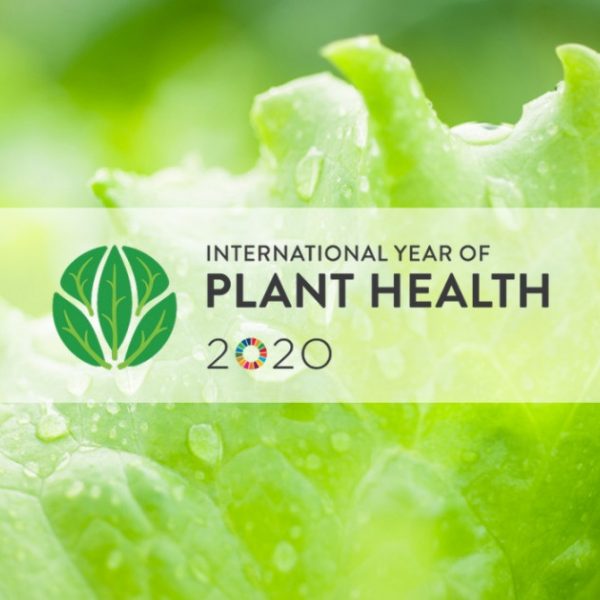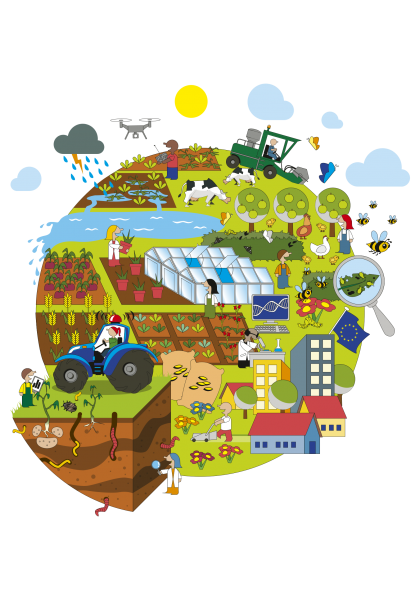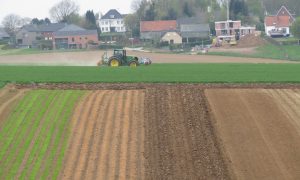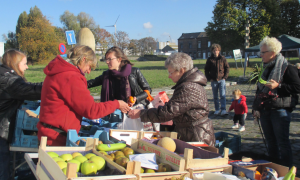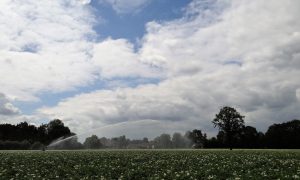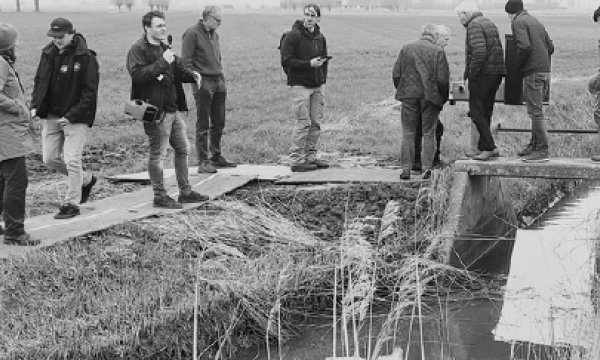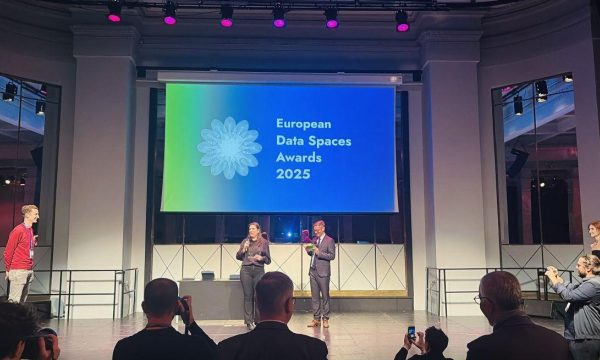Sector | Plant production Horticulture & ornamental cultivation
Horticulturists and ornamental growers will find an answer to the question “what can ILVO do for me?” here. You’ll get a brief overview of relevant expertise, analyses, infrastructure, and the professional approach that characterizes ILVO. You can contact the Plant and Soil Living Lab for specific services and questions regarding collaboration.
Go to Plant and Soil Living LabQuick links
What does ILVO do?
-
ILVO has its own breeding programs in garden roses, azaleas, and woody ornamentals. In addition, company-specific breeding programs are also supported by ILVO. These breeding programs can be carried out both confidentially and publicly. ILVO applies both traditional and new breeding techniques, such as molecular markers, embryo rescue, polyploidization, protoplast fusion, Crispr/Cas, and uses drone images for high-throughput phenotyping and monitoring of crop growth and development. The focus here is on the development of more robust cultivars and/or cultivars with interesting innovative characteristics.
New cultivars resulting from ILVO’s breeding program in azaleas and woody ornamental plants are commercialized through two cooperative growers’ businesses:
- Azanova for azalea
- BEST-select for woody ornamentals
> More info: ilvogenomics.be
> More info about ILVO’s climate research: Center of Expertise for Agriculture and Climate
-
ILVO’s Diagnostic Center for Plants analyzes samples of soil, water, and plants for the presence of pests, mites, nematodes, viruses, bacteria, and fungi. Moreover, by studying the biological cycle of these organisms, plant physicians look for sustainable control techniques. The emphasis is on prevention, crop technical measures, and biological control for application in integrated pest management (IPM). The interactions between plant, attacker, and soil or substrate are also investigated in this context. After all, using plants with good resilience in a healthy soil or substrate can avoid the use of crop protection products further down the chain.
> More info: Diagnostic Center for Plants
-
ILVO investigates the relationship between the growth and development of crops and environmental factors. An important aspect of this research is the response of plants to a changing climate. We use insights from ecophysiology (e.g. plant-water relationships) and model the effect of current and expected future environmental conditions (e.g. drought) on plant growth and development. For this, we use high-throughput crop phenotyping based on image analysis.
> More info about ILVO’s climate research: Center of Expertise for Agriculture and Climate
-
ILVO conducts research into irrigation techniques, soil-plant interactions, and water use in agriculture. Literally making room for water is central here, so that water has the chance to infiltrate the soil, so it can be buffered for dry periods, and so it can be collected for reuse. Water is an important spearhead in climate research at ILVO.
> More info about ILVO’s climate research: Center of Expertise for Agriculture and Climate
> Also read about Water in agriculture
-
ILVO performs multiyear experimental and practical research to test combinations of soil improvement measures, such as different fertilization forms, soil cultivation (e.g. tilling vs. non-inversion tilling), soil improvers (e.g. compost), groundcovers, and crop rotation. By doing so, we investigate the effect on soil fertility, soil structure, soil life, nutrient dynamics, and crop performance. ILVO has a specialized lab for the analysis of chemical, physical, and biological soil quality parameters. ILVO also researches the causes of and solutions for soil degradation, and has specific expertise in erosion, compaction, and loss of soil organic matter. Research into soil management and cultivation techniques with a view to sustainable carbon and water management is one of the spearheads of ILVO climate research.
> More info about ILVO’s climate research: Center of Expertise for Agriculture and Climate
-
ILVO has a licensed composting site and makes its expertise in farm composting available to test centers and individual businesses. ILVO also conducts research into the composition, the process, and the quality of the end products of composting and fermentation of organic residual streams, including animal manure.
-
ILVO conducts research into the possibilities of sustainable growing media based on local biomass. Compost and plant fibers (wood fiber, miscanthus straw, heath chopper sod, flax loam, etc.) form a sustainable alternative to white peat in cultivation substrates. Moreover, plant fibers can be grafted to biocontrol fungi, which reduces the use of crop protection agents. Biochar and chitin can in turn make plants less susceptible to diseases and pests.
> More info: ILVO website about the bioeconomy and growing media
-
ILVO conducts research into the optimization of cultivation techniques for both ornamental plant cultivation and (organic) vegetable cultivation: judicious fertilization, soil cultivation, groundcover management, weed control, etc. An important instrument ILVO uses for this is innovative mechanization, such as robotization.
-
Through the development of a robot framework, ILVO wants to put knowledge about robotics into practice and also give smaller farms, which need flexibility and cost efficiency, access to automation.
ILVO also has a fully equipped workshop and an experienced team to design, build, and evaluate prototypes for automation and robotization in a practical environment.
> More info: Living Lab Agrifood Technology
-
ILVO is internationally known and praised for its research into mechanization and spraying technology with the aim of more sustainable application technology for crop protection products and fertilizers. ILVO is also responsible for the execution of the mandatory inspection of spraying equipment in Flanders and has a BELAC‐accredited Spray Tech Lab equipped with the latest measuring technology.
> More info: ILVO’s Spray Tech Lab
-
ILVO has been active in agroforestry (forest agriculture) for many years, as a coordinator of the Agroforestry Flanders Consortium and as a partner in various (European) projects. ILVO actively collaborates with the Flemish ornamental grower's guild AVBS and various individual tree nurseries, specifically within the field of horticulture. In addition, the Agroforestry Flanders Consortium investigates the possibilities and potential added value of different forms of agroforestry in small-scale vegetable cultivation (e.g. CSA) and industrial vegetable growing (with a focus on soil quality challenges, erosion, drought, and suitable variety combinations).
> More info: www.agroforestryvlaanderen.be
> See also what ILVO does for organic agriculture
-
Genomics embraces the study of genes and genomes, i.e. the hereditary material of a plant. ILVO can determine the sequence of the DNA of an individual or a group of individuals relatively inexpensively using so-called high throughput sequencing. Thanks to the Genomics Platform, ILVO has all the knowledge in-house to generate and analyze such data (bioinformatics). This knowledge is then used to develop molecular markers that are useful for breeding, to detect pathogens, and to gain functional insights around genes that have an impact on e.g. growth, flowering, and drought stress.
> More info: ilvogenomics.be
-
ILVO strives for livelihood security and a more stable income for all links in the agrifood chain, through economic business and sector analysis, research into profitability, added value, market competition, organization of sales, consumer preferences, and the role of cities and municipalities. In order to convert the theoretical knowledge from the research into recommendations that provide support for business leaders, ILVO builds useful web applications and tools.
-
Food companies and on-farm food processors can contact the ILVO and Flanders’ FOOD pilot food processing plant called the Food Pilot, with questions concerning food processing, process and recipe development, and food safety, authenticity, and quality analyses. There is a specific subsidy channel for on-farm food processors, i.e. the ‘KRATOS innovation support for on-farm food processors’ (NL).
In addition, ILVO has specific research expertise in the valorization of residual flows released by various production systems, such as wet horticultural surpluses and used growing media.
How does ILVO work?
ILVO aims to support all stakeholders in the Flemish horticultural and ornamental plant cultivation sectors with the above broad palette of expertise and a modern research infrastructure.
Your point of contact: the Plant and Soil Living Lab
The Plant and Soil Living Lab at ILVO aims to respond to the needs and questions of the agro-food sector. They focus on sustainable, innovative technologies to optimize crop efficiency and at the same time, reduce the environmental impact. This living lab's extensive expertise and infrastructure and a wide stakeholder network make a high-quality, strong, multidisciplinary approach to this research possible.
Your ILVO guarantee
- Scientifically-based solutions
- Individual and/or co-creative guidance for innovation trajectories
- Confidential treatment of your question
- Clear and easy-to-interpret results that are applicable to day-to-day operations
- Technological support for various farm processes
Specialized research infrastructure
- > 200 ha trial fields and an extensive range of rolling field trial machinery
- > 15.000m² greenhouse infrastructure and climate chambers for research, including for quarantine organisms
- 50 ha organic trial fields and an agro-ecological trial platform
- Composting site and compost reactor
- 'Rainout shelters' for research on drought stress in plants
- Plant-ecofysiological infrastructure, appropriate software and data-mining pipelines
- Lab for tissue culture, molecular analysis and microscopy, soil, substrate and plant analyses
- Belgian and EU reference labs for plant pests and pathogens: the Diagnostic Centre for Plants
- An accredited lab for spray technology
All of the ILVO expertise centers at your service
ILVO works in an interdisciplinary fashion and has a network of living labs that work closely together. A problem or question is therefore examined from many different angles by ILVO experts from different disciplines. This is guaranteed by ILVO's broad and systematic approach, together with the typical openness of the ILVO culture.
Broad network
ILVO has a broad network in the ornamental and horticulture sectors, from breeders and grower-producers to distributors, policymakers and peer research institutes.
In the Technology Platform for Ornamentals (Technopool Sierteelt) ILVO joins forces with Ghent University, University College Ghent, and PCS Ornamental Plant Research to 1) share research knowledge and expertise with ornamental growers and 2) to ensure that research is demand- and market driven. Quality and innovation are the priorities for this blooming economic sector.
Contact an expert
